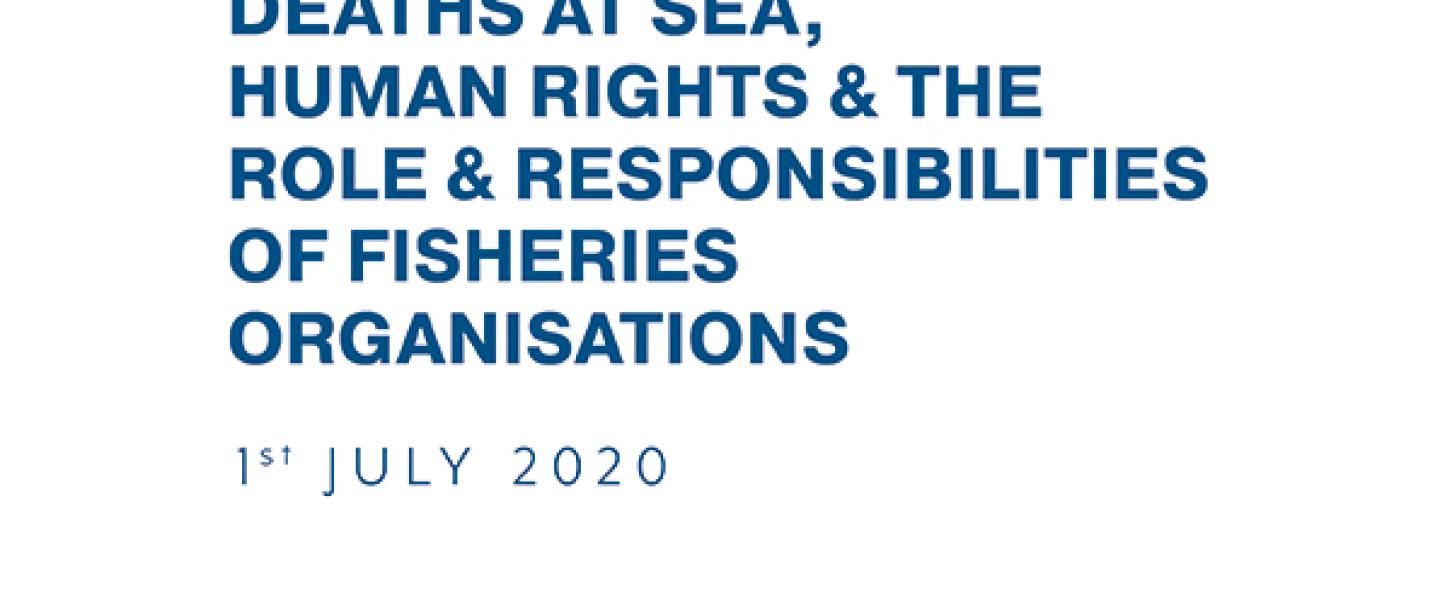Press Release
3 July 2020
UPDATED 9 July 2020 – Low & High Resolution Report links added
“Is there a ‘thank you’ to the observer? Something to sustain his widow and children for a few years, at least? Not often. The final ignominy is that compensation or insurance takes ‘a little while’ to come, if it does at all.”
London, UK. Human Rights at Sea today publishes an extensive human rights focused report looking into the ongoing issue of Fisheries Observer protections and deaths at sea in the complex and highly-competitive commercial fishing industry supply chains that they work in.
It raises fair questions and challenges about the future role and responsibilities of all fisheries organisations, including certification schemes and management bodies, in their ability to better tackle the lack of current public awareness of incidents, of the need for transparent reporting of cases, and in the assisting with routes to effective remedy for dependants following human rights abuses perpetuated at sea.
The report highlights publicly available facts in the ongoing investigation of the case of the death of Kiribati Fisheries Observer, Eritara Aatii Kaierua, onboard the Taiwanese flagged WIN FAR No. 636, as reported in The Guardian on 22 May 2020 in the article “Disappearances, danger and death: what is happening to fishery observers?”. It also hears about the consequences on the family of Eritara Aati who are seeking answers about the circumstances of his death around the 4 March 2020.
It looks at the problematic issues of the use of vessel’s Automatic Identification System (AIS) and the Vessel Monitoring System in present cases, and highlights other cases of Fisheries Observer deaths at sea.
Scrutinised with peer reviews from the Board of the US-based Association for Professional Observers, oversight and input from leading international and non-governmental organisations, and disclosed submissions by several stakeholders, the report aims to act as a trigger to push for a more collaborative route to better address the safety, welfare and human rights protections for Fisheries Observers, not just in the Pacific Region, but globally.
The report strictly focuses on the protection of the human element in fishing, and which is often lost in the noise of commercial positioning in the sector.
The Report highlights 10 key recommendations which, if addressed, could pave the way for significant positive changes for the safety of workers at sea. They are:
- Recommends transparent and unimpeded investigations into all cases of human rights violations against Fisheries Observers and crew, including the full and unredacted public disclosure of the facts, findings and outcome by the State authorities involved, for public scrutiny by those related international fisheries certification organisations, Observer associations and civil-society entities with a vested interest.
- Recommends regular engagement of Interpol, alongside flag, port and coastal State authorities, for all violations of individual fundamental human rights of Fisheries Observers and crew, including, but not limited to, murder (homicide), violence towards the person resulting in bodily harm, sexual assaults, slavery, trafficking and deaths at sea.
- Recommends that any Observer death, disappearance, illness or injury must be immediately reported to the Observer programmes, and subsequently there should be forfeiture of confidentiality with full disclosure of any VMS data associated with any voyage where an Observer disappears or dies at sea.
- Recommends that there must be a mandated provision of personal communication devicesindependent of any vessel communications electronic systems for all Observers working at sea, globally.
- Recommends that international fisheries certification organisations should mandate all registered vessels, as part of the contractual terms and conditions for use of their schemes, to promote, and where able, to assure continuous operation of AIS on all certified vessels to allow public cross-referencing with VMS data at all times, independent access, review and monitoring of vessel and fleet VMS data; two Observers per vessel, or one Observer plus on-board tamper-proof equipment supporting electronic monitoring.
- Recommends that international fisheries certification organisations should maintain centralised, consistent, up-to-date, and publicly available lists of all certified vessels, and where applicable include available registration details, as well as those suspended and/or excluded, with regular proactive public disclosure of the reasoning for suspension and/or exclusion.
- Recommends that international fisheries certification organisations should immediately freeze the certificates of all vessels involved in allegations of human rights abuse until investigations are concluded. This would allow buyers to avoid problematic vessels, protect the remainder of the supply chain, and provide reassurance that due process is being carried out by competent authorities.
- Recommends that all fisheries management organisations, fisheries certification organisations and bodies, and fisheries management platforms should have, as a bare minimum, public-facing policies that reflect published business strategies to include fundamental human rights protections and necessary safeguards for all workers in their area of influence, reflecting international legislative and voluntary human rights and labour rights norms.
- Recommends that all fisheries management organisations should introduce internal collation and reporting mechanisms for the recording of incidents of human rights and labour rights abuses, for subsequent investigation by the competent authorities. This should include published pathways for internal reporting, investigation, external independent review, and routes to remediation and effective remedy.
- Recommends that in the circumstances of a death at sea, employers must act expeditiously to compensate families for their loss, while ensuring that, at all times, effective insurance policies are in place.
Low and high resolution versions of the report can be downloaded below:
